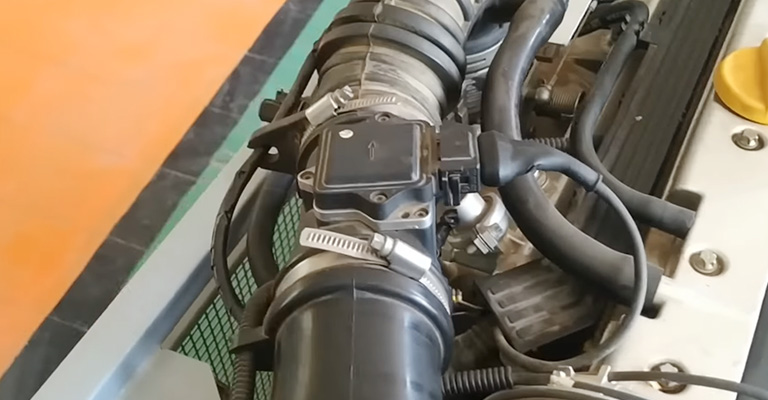When your mass air flow sensor fails, your vehicle may experience a decrease in power, rough idling, and even a decrease in fuel efficiency. Additionally, you may notice hesitation or surging during acceleration, as well as check engine light illumination.
Ignoring these symptoms can lead to further damage to your vehicle’s engine, so it’s important to address them promptly. By understanding the signs of a bad mass air flow sensor, you can ensure the proper functioning and longevity of your vehicle.

Credit: hondatheotherside.com
Common Symptoms of a Bad Mass Air Flow Sensor
A bad mass air flow sensor can cause various symptoms in your vehicle. Some common signs include rough idle, engine stalling, poor acceleration, and engine misfires. These symptoms indicate that the mass air flow sensor is not functioning properly. A rough idle occurs when the engine is not running smoothly at idle speed.
Engine stalling refers to the sudden shutdown of the engine while driving. Poor acceleration means the vehicle is not gaining speed as it should. Engine misfires can be felt as a loss of power or a jerking sensation during acceleration.
If you notice any of these symptoms, it is important to have your mass air flow sensor checked and potentially replaced by a professional mechanic. Ignoring these signs can lead to further damage to your vehicle’s engine.
Effects On Fuel Efficiency
Symptoms of a bad mass air flow sensor can have adverse effects on fuel efficiency. One major impact is a decrease in MPG, leading to higher fuel consumption. This sensor plays a crucial role in measuring the amount of airflow entering the engine.
When it malfunctions, inaccurate readings are sent to the engine control unit, resulting in a rich air-fuel mixture. Consequently, the engine burns more fuel than necessary. This leads to decreased mileage, as the vehicle covers fewer miles per gallon of fuel consumed.
The increased fuel consumption not only burdens the driver’s budget but also has negative environmental implications. It is essential to recognize the symptoms of a faulty mass air flow sensor, such as stalling, surging, or a decline in engine performance, to address the issue promptly and improve fuel efficiency.
Impact On Engine Performance
A bad mass air flow sensor can have a significant impact on engine performance. One symptom is a loss of power, as the sensor plays a crucial role in determining the correct air-to-fuel mixture for combustion. Another sign is hesitation during acceleration, where the sensor’s faulty readings cause the engine to struggle in delivering power smoothly.
Additionally, engine surging can occur, with inconsistent and unpredictable fluctuations in RPMs. These symptoms can be frustrating for drivers, as they result in poor acceleration and overall sluggishness. It is important to address these issues promptly, as continued use of a bad mass air flow sensor can lead to further damage and decreased fuel efficiency.
Regular maintenance and inspections are key to ensuring the sensor is functioning optimally and preventing these symptoms from occurring.
Frequently Asked Questions Of Symptoms Of A Bad Mass Air Flow Sensor
How Do You Know If Your Mass Airflow Sensor Is Bad?
A bad mass airflow sensor can cause issues like poor acceleration, engine misfires, and decreased fuel efficiency.
What Happens When Mass Air Flow Sensor Goes Bad?
When the mass air flow sensor goes bad, it may cause issues such as poor fuel economy, stalling, or hesitation during acceleration.
What Issues Can Occur After Replacing Mass Air Flow Sensor?
After replacing the mass air flow sensor, issues may arise such as poor fuel economy or engine misfires.
Can A Bad Mass Air Flow Sensor Cause Loss Of Power?
Yes, a bad mass air flow sensor can cause power loss in a vehicle.
Conclusion
The symptoms of a bad mass air flow sensor can cause significant issues with your vehicle’s performance. If you notice a decrease in fuel efficiency, irregular engine idling, stalling, or difficulty starting your car, it may be time to check your mass air flow sensor.
Another common symptom is a loss of power or acceleration while driving. Ignoring these symptoms can lead to further damage to your engine and increased repair costs. Thankfully, addressing a faulty mass air flow sensor is relatively straightforward. By cleaning or replacing the sensor when necessary, you can restore your vehicle’s performance and save money in the long run.
Remember, early detection and regular maintenance are key to keeping your car running smoothly. So, if you’re experiencing any of these symptoms, don’t hesitate to have your mass air flow sensor checked and take the necessary steps to ensure the longevity of your vehicle’s engine.
